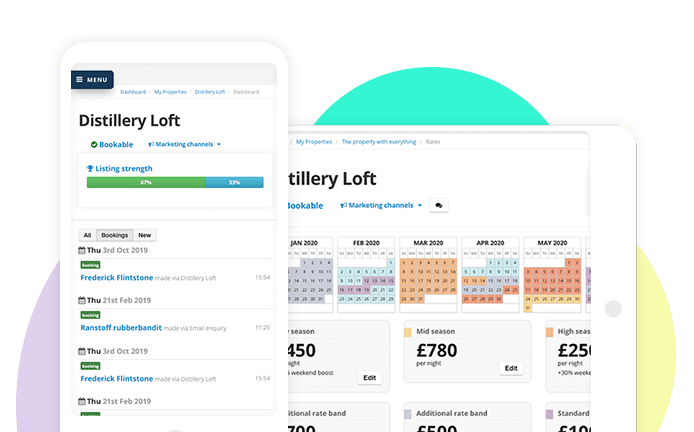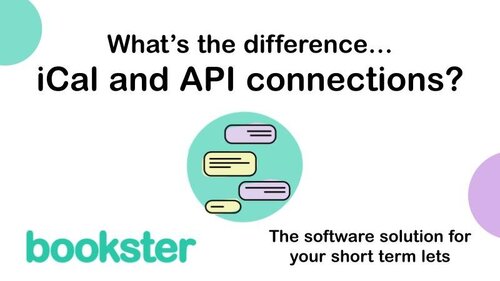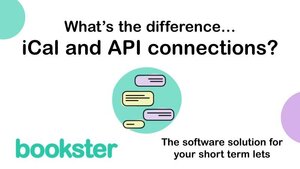iCal & API connections for short term lets - what’s the difference?
4 minute read // updated
Key Takeaways
- Software & Channel websites communicate via different methods: iCal and API
- An iCal connections is cheap and easy to use but shares dates only, & receive little booking data
- API shares booking, rates and property data

There are striking differences between an iCal and an API connection, but it's not as clear-cut as some people think.
We dig into the differences between these two standard connections.

There are different methods that softwares use to share information, each with their own advantages and disadvantages.
What’s the difference between iCal and an API (direct) connection?
Often, property managers with holiday rentals want to promote the holiday rental home on a channel like Airbnb or Booking.com.
This means that information about properties, availability and bookings has to be shared.
There are different methods to share that information, each with their own advantages and disadvantages.
If you use a software to help you with your business, (usually a Property Management Software or a Channel Manager), they communicate with the channel, and the channel communicates back.
The way that they communicate is through either iCal or an API connection (also known as a Direct connection).
This article will explain the difference between iCal and an API connection and cover the pros and cons of using each.
To make this easier, we’ll refer to your Property Management Software or Channel Manager as ‘Software’ and your Channel eg Airbnb as ‘Channel’.
What is an iCal connection?
Let’s start with an iCal (iCalendar) connection.
iCal stands for Internet Calendar. It is a file format for sharing calendar information and is widely used by calendar applications. You may have seen this in other places, like when you view your daily activities in your online Google Calendar or Apple Calendar.
Your Channel asks the Software what dates are booked in your property. The Software sends it your booked dates. This stops those dates being booked by other guests.
Each Channel asks for that information according to their own frequency - it could be every hour, it could be once a day. Some channels will check your iCal feed just before taking a booking.
The Channel communicates to your Software when a guest makes a booking on their Channel for your rental property.
The Channel may also choose to share some additional booking information.
Your Software blocks those dates, and communicates that with other channels, including your website.
iCal connections for short term lets - Pros and Cons
This system isn’t perfect, so let's break down the details.
Pro 1: It's simple and easy
iCal connections are very easy to use, by property managers, Software and Channels.
This makes them very accessible and opens opportunities to be visible to millions of people on many channels.
Pro 2: Price
An iCal connection is usually free to use, which makes it an attractive option to many property managers and owners.
Con 1: Availability Only
iCal is designed to share date based information - so can be used to show when a property is available or not. That is pretty much it.
Con 2: Property data
Your listing information isn’t shared with the Channel website.
This means you need to log in to each website and update each Channel to change your rates, descriptions and photos etc.
This is time-consuming and sometimes gets forgotten.
Con 3: Booking data
The Channel may share a small amount of booking information (iCal is not very secure).
You have to log back into the Channel to view booking information.
If you want a complete record of bookings in your PMS you will need to create a booking within your PMS (e.g. Bookster). Bookster makes this as simple as possible but it is still an extra step.
Con 4: Risk of double bookings
iCal connections work by the Channel asking the Software for booked dates.
The Channel chooses when to do this, and ranges from once every couple of hours, to once a day.
This means there may be times when a guest makes a booking, (eg on your website), but the Channel doesn’t ask for blocked dates immediately. This leaves opportunities for double bookings.
If the Channel proactively asks for blocked dates before another booking goes ahead, there is a lower risk for double bookings.
What is an API connection?
API stands for Application Programming Interface.
It’s a technical name for how two pieces of software talk to each other (in this case, we’re talking about your Software and your Channel).
Your Software pushes information to the Channel when it is changed. This stops the property being booked.
The Channel communicates back when someone makes a booking on their Channel for that property, and shares additional booking information.
The Software will block those dates in the central calendar, and communicates the blocked dates with other Channels.
Pros and Cons of API connections for short term lets
No matter what you hear, this system isn’t perfect either.
Pro 1: Booking data
The channel shares extensive booking data with the software, including booked dates, guest details, guest communications.
This saves you having to log into different places to get the data you need.
Pro 2: Ease of use
A property manager will find it easy to update information and manage bookings when using Software with reliable API connections.
Pro 3: Lower risk of double bookings
A quick google search, and you’ll find plenty of posts that say with an API connection there is no risk of overbookings, or double bookings, but that isn’t the case.
An API connection can reduce the risk of double bookings.
Pro 4: Property data
With API connections, your listing information is shared with the Channel, which means you don’t need to manually update each Channel every time you want to make updates to your prices, descriptions and photos.
Con 1: More Complication = More to go wrong
API connections are by nature more complicated, and a simple change on either side of the Software or the Channel can cause hiccups.
Con 2: Property data
An API connection doesn’t mean that all property listing information is shared.
The information that can be shared depends on a number of factors:
- What information is held within the PMS;
- The last time the connection was updated;
- The skills and time available of the technicians;
- How actively the connection is managed.
As changes are made on the Channel, there are opportunities for additional pieces of information to be communicated.
However, this requires the software to prioritise these updates.
Hence, no two API connections with any Channel are exactly the same.
So what’s the difference between an iCal Connection and an API connection?
An iCal connection shares booked dates only.
An API connection could do availability and everything else.
1. Frequency and method that booked dates are shared
With an API connection, a Software proactively pushes the booked dates to the Channel as soon as it receives them, whereas an iCal shares the booked dates only when a Channel asks for the information, which can be anytime, up to only once a day.
This can have a big impact on the risk of double bookings, although neither system is perfect.
2. Sharing property information
iCal connection shares booked dates with the Channel, whereas an API connection can share significantly more, including Photos, Descriptions, Maps, Videos, Rates, Discounts, Cleaning Fees, and more.
However, the amount that an API connection shares varies from Software to Software. This can have a big impact on the time it takes you to keep all Channels and your website in sync.
3. Booking data
A Channel communicates booking information with the Software, but the information it shares in an iCal Connection is minimal, often booked dates only.
A Channel using an API Connection shares significantly more information including the guest names, extras booked, price paid, price outstanding, etc.
This can have an impact on the time it takes you to gather the information you need to manage your guest booking.
Frequently Asked Questions
- What’s the difference between an iCal Connection and an API connection?
- iCal Connection: shares holiday rental blocked/booked dates only.
API Connection: syncing of holiday rental availability, pricing, bookings and everything else. - What is an Channel Manager API connection?
- It is a sophisticated way of your PMS and website (e.g. Airbnb) talking to each other to share information
There is no perfect method to communicate information from one software to another.
When choosing what method you want to use for your holiday rentals, take time to consider the advantages and disadvantages of each approach.

